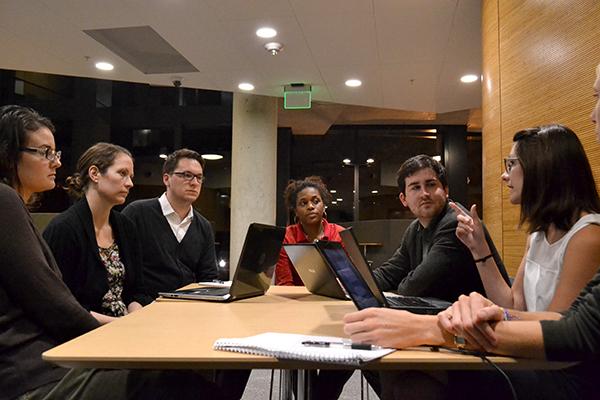Updated: Oct. 10, 2014 at 12:49 p.m.
A group of public health graduate students will spend the semester creating a comprehensive plan for bringing sexual assault in the military to the forefront on campus and in national politics.
The group of seven students will launch a social media campaign and meet with sexual assault survivors, in the hopes of inspiring voters to write to their representatives about passing reforms for how the military responds to sexual assault.
While it may be a daunting goal, the group’s predecessors have a history of success: Two years ago, a cohort of students in the same class were the driving force behind GW’s decision to become a smoke-free campus. Another year, in an effort to lower HIV transmission rates, the group convinced a CVS store in a low-income neighborhood to unlock the condoms behind its counter.
Ben Vipond, a 2012 alumnus, said the students hope to take “the project outside the confines of the class and the paper that we’re turning in.” He said members will meet with advocacy groups, such as Protect Our Defenders, which is dedicated to stopping rape in the military.
“I think that currently what’s happening is that the military judicial system is failing the women and men who are sexually assaulted in the military,” Vipond said.
One in five women in the military reported unwanted sexual contact while serving, according to a report released by the Department of Defense last year. About 5,000 soldiers reported complaints of sexual assault last year, the highest number in the last decade, though sexual assault remains one of the most underreported crimes.
Laura Bader, who graduated from the University of Colorado with an undergraduate degree in international affairs in 2011, said the students will share information about their project and sexual assault in the military during a Colonials’ Weekend block party this Sunday.
Bader said the group hopes to encourage people “to talk, write a letter and use Twitter to contact” political leaders about military sexual assault. The group will also speak with survivors about their experiences and the types of legislation that could help.
Caroline Sparks, an associate professor of prevention and community health in the public health school, has taught the “action-driven” class for a decade, pitching ideas to students who then pick the topic about which they are most passionate.
She said she is letting the students work on their projects on their own and is “kibitzing on the sidelines.”
The students are also trying to raise awareness of the Military Justice Improvement Act, which Sen. Kirsten Gillibrand, D-N.Y., introduced last spring to strengthen the military’s response to sexual assault. Currently, military commanders have the authority to decide if a case should proceed to trial. The legislation would hand that power to prosecutors in the Judge Advocate General’s office, a change that opponents of the bill call impractical.
Members of the military have two options when reporting crimes. If a soldier files a restricted report, he or she has access to counseling, but only unrestricted reports will launch an investigation into the complaint. Of the 5,000 sexual assaults that were reported last year, about 3,700 triggered an investigation and about 32 percent of those cases ended in punishment for the assailants.
Beatriz Menanteau, a staff attorney in the women’s rights program at the Advocates for Human Rights, said a “hierarchical culture” in the military puts soldiers at greater risk of experiencing sexual assault.
“Where there’s already strict divides in power, there is likely to be a breeding ground that can allow sexual assault,” Menanteau said.
Because sexual assault cases are prosecuted within the military, the crime becomes “more difficult to see,” Menanteau said.
She said the group believes the military should require more training about sexual assault and available resources.
“They all need to have training in how to respond to sexual assault and other forms of violence,” Menanteau said. “They need to have a common understanding on what sexual assault is and they need to be able to work together to take the steps necessary to hold people accountable and provide the victim with protection.”
This post was updated to reflect the following correction:
The Hatchet incorrectly reported the last name of 2012 alumnus Ben Vipond. It is Vipond, not Vipold. We regret this error.







